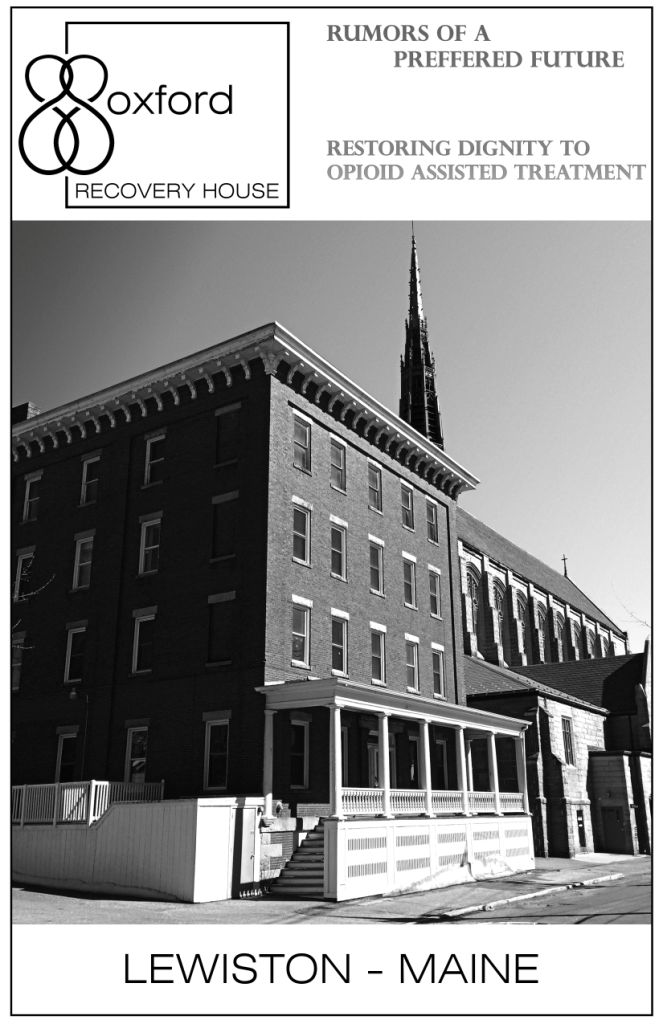Grace Street Recovery Services - The New Jerusalem for Opiate Addictive Disorders in Maine.

Addiction Treatment Articles
Addiction Alternative Treatment
Opioid Addiction Treatment
Suboxone Treatment
Overview
Originally Published: 03/30/2016
Post Date: 03/30/2016
by Tim Cheney | Marty O'Brien
Summary/Abstract
Grace Street Recovery Services is the first Medication Assisted Recovery Residence for opioid dependent persons in New England It offers a creative, spiritual sanctuary to address the biopsycosocial elements of addiction by a team of Licensed clinicians and ABAM Physicians.
Content
Grace Street Recovery Services
The New Jerusalem for Opiate Addictive Disorders in Maine.
 |
Let Us Help You Find Your Way Home |
 |
What happens when you take two individuals in long term recovery with theological backgrounds coupled with a talented medical and clinical team and set them loose with a vision to create a recovery continuum from a syringe exchange to recovery that embraces all paths to recovery and all paths in recovery.
Answer: A creative, spiritual sanctuary that allows you the peace and community to gain the insight necessary to empower change and the volitional potential to sustain recovery.
Grace Street Services and The Choopers Foundation are excited to announce that we will be opening, on April4, 2016, the first Medication Assisted Recovery Residence for Opioid dependent individuals in the state of Maine. Our program will offer a structured, safe environment with clinical, vocational and educational services and support in a renovated 18th century building in downtown Lewiston. The program is for adult men and women and will initially have 14 single rooms with ten rooms being added by August, 2016.
Our program is designed specifically for heroin and opioid dependent individuals who want to get their lives back who are currently taking either Suboxone or Methadone or Vivitrol.
“You are fettered,” said Scrooge, trembling. “Tell me why?”
“I wear the chain I forged in life,” replied the Ghost. “I made it link by link, and yard by yard; I girded it on of my own free will, and of my own free will I wore it.” ~ Charles Dickens
What if
you could find ways to build a life of strong recovery out of the wasteland of addiction that converges best practices around a future that shimmers with hope and dignity? What if you could author your own story of the harsh landscapes you may have found yourself. We think you can.
Can this be true ?
You bet. And we’ll throw in a music/video studio, peer recovery support and work at Clark Cove Farm, surrounded by a waterfront apple orchard, hiking trails and perennial gardens. Cross country ski in the winter thru the meadows or fields or on trails in the woods or cruise the cove in a canoe or kayak during the spring, summer and fall. Pick apples and learn to make cider. Plant your own vegetable garden. We’ll prepare the plot and you plant it, weed it and, of course, eat the spoils.
If you skateboard and snowboard, imagine riding in the morning, hit a recovery group in the early afternoon and then head to the skate park. Grab dinner with your peers, chill for a bit then head over to W550 to design || build one of the projects you’re working on.
A Different Approach
The possibility to transform lives by carefully listening to your story and beginning the early work of re-authoring and rewriting a story that opens pathways out of that old, tired wasteland of dislocation and into a preferred future. Imagine a place where that old story can be the foundation for a life defined by you and your recovery. One that you own. Now that seems very, very cool to us.





